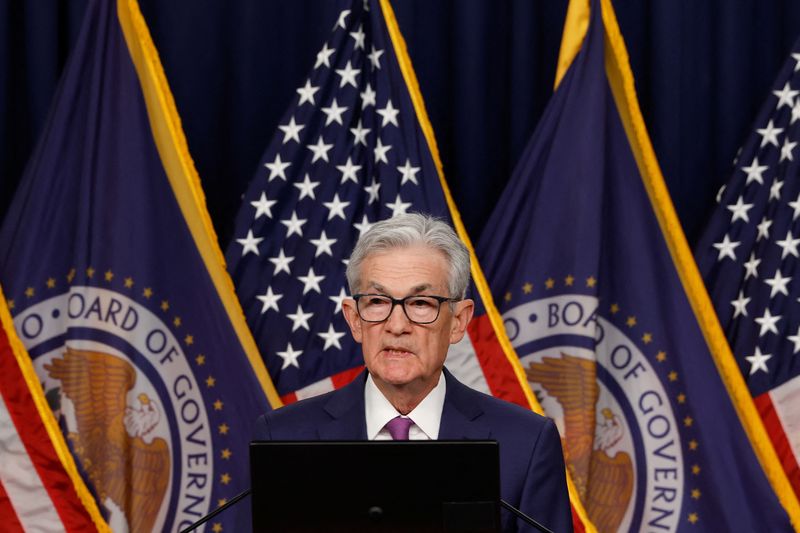By Michael S. Derby
NEW YORK (Reuters) - U.S. Federal Reserve Chair Jerome Powell said on Wednesday that officials have begun discussing what it would take for them to stop the ongoing run-off of the central bank's balance sheet.
Balance sheet run-off "has gone very well," Powell said at his press conference following the latest rate-setting Federal Open Market Committee meeting. He was referring to a process known as quantitative tightening, or QT, which involves the Fed allowing its holdings of cash and bonds to contract by way of allowing Treasury and mortgage bonds it owns to mature and not be replaced.
QT, which has seen the Fed shrink its holdings by over $1.3 trillion to $7.7 trillion, has run independently from the Fed's rate hike cycle but nevertheless complements it. And with rate cuts standing as the Fed's next likely move, many in markets have been expecting the central bank to wind down QT this year as well.
"We're getting to that time where questions are beginning to come into greater focus about the pace of run-off and all that," Powell said. "So at this meeting, we did have some discussion of the balance sheet, and we're planning to begin in-depth discussions of balance sheet issues at our next meeting in March."
The pace of debate pointed to by Powell suggests the QT effort could be in play for longer than many top Wall Street analysts had been expecting.
Going into this week's FOMC meeting, signs of a rapid pull-back in key measures of market liquidity had driven a number of analysts to argue the Fed would lay out the start of a formal plan to shutter the QT effort at the March meeting. Some even saw QT ending by summer.
The Fed is widely expected to slow at some point the speed at which it allows Treasury securities to run off the balance sheet, reducing the current cap of $60 billion. As the Fed wants to get back to an all government bond portfolio and has struggled to reach the $35 billion per month cap on the mortgage bond run-off, many expect the Fed to allow that type of contraction to continue even after QT ends.
Slowing the rundown is a prelude to stopping QT altogether, but some have argued that an earlier slowdown of QT could give the Fed more space to run the effort for longer. The Fed is trying to strip the market of excessive liquidity added in the response to the pandemic, and doesn't want to push QT too far lest it destabilize money market rates.

Many have looked to the Fed's reverse repo facility as a proxy for excessive liquidity and have argued that facility, which peaked at about $2.6 trillion on the final trading day of 2022 and was at $615.4 billion on Wednesday, will likely fall to zero before QT can stop. But Powell suggested that might not be right.
The correct level for the reverse repo facility is "not a decision that we've made," Powell said, adding "we wouldn't be taking a position it's got to go to zero."